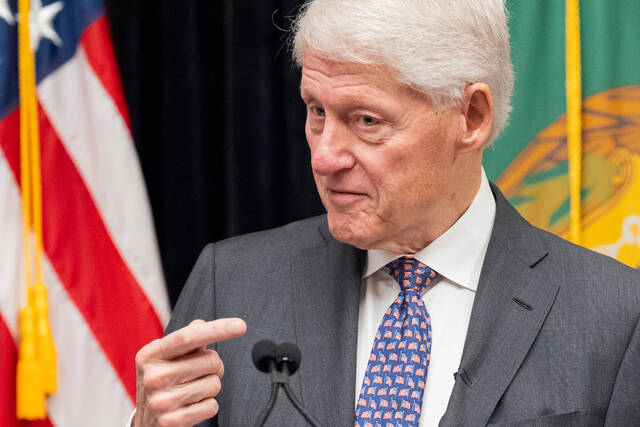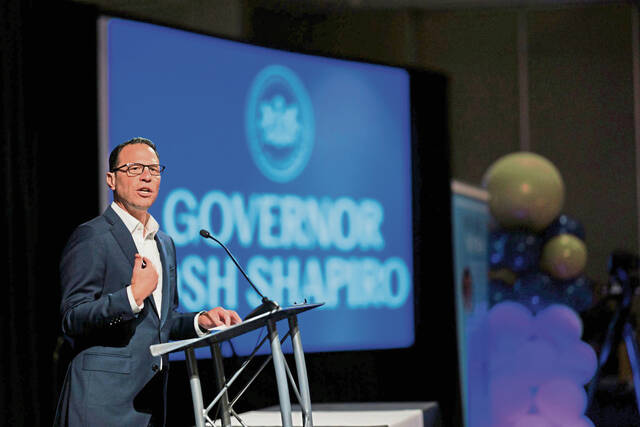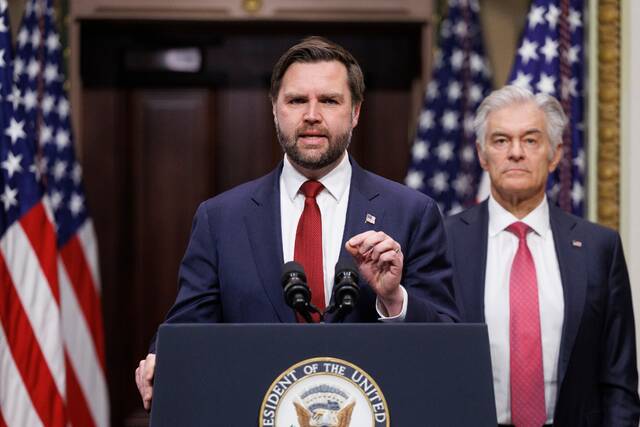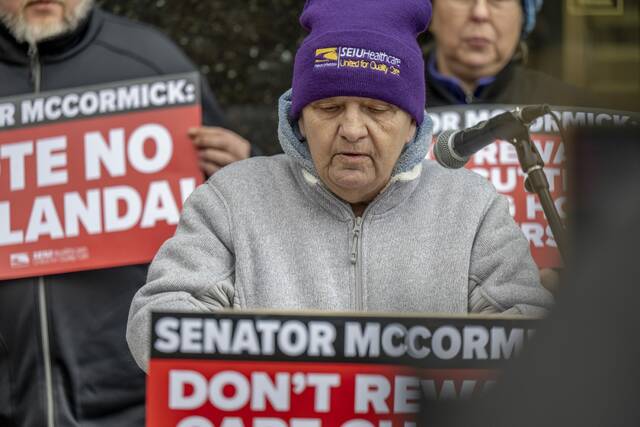WASHINGTON — President Trump is preparing to threaten Mexico with sweeping new tariffs as part of an attempt to force the country to crack down on a surge of Central American migrants, administration officials said Thursday, a risky move that could rattle already jittery financial markets and imperil an impending North American trade deal.
White House officials are looking at implementing the tariffs using the International Emergency Economic Powers Act of 1977, which gives Trump broad power to impose import penalties during a national emergency, officials said. Trump declared such an emergency earlier this year in a bid to free up money for construction of his long-promised border wall, but the designation could also make it easier for him to restrict trade.
Final decisions about how the tariffs would be implemented had not been made as of Thursday afternoon, but Trump appeared intent on announcing a plan Friday, according to administration officials, who spoke on the condition of anonymity to discuss internal deliberations.
In his written statement Trump says beginning on June 10, tariffs on Mexico will continue to be raised each month — up to 25% — percent until the US is satisfied the country has done enough to address the migrant flow into the United States. pic.twitter.com/1rBF7iaOdE
— Abby D. Phillip (@abbydphillip) May 30, 2019
Trump is considering one scenario that would raise fees on virtually all imports from Mexico, which ranks as the second-largest supplier of goods to the United States, one of the officials said.
The potential threat combines two of Trump’s favorite issues — immigration and trade — and comes as he has struggled to score victories on both. The administration is bogged down in an escalating trade war with China that has damaged farmers and other U.S. producers, while crossings at the U.S.-Mexico border driven by Central American migrants seeking asylum have peaked to their highest level in more than a decade.
One senior White House official said there is broad support across the administration to push Mexico further by using tariffs to force action. Other aides, however, were attempting to talk Trump out of the idea, arguing that the threat would scare global markets and undermine passage of the United States-Mexico-Canada Agreement, or USMCA, which was just sent to Congress on Thursday by the White House. The trade deal aims to curb the type of tariffs Trump is now threatening to impose if Mexico does not stop the migrants.
.@WhiteHouse just wrapped a call about Mexico tariffs. Someone asked what is a metric that set for success here when the tariffs can be taken off.
— Elizabeth Landers (@ElizLanders) May 31, 2019
Mulvaney: “We did not set a specific percentage or specific number” says admin will assess on “a day to day and week to week basis”
Such tariffs, if enacted, would likely have an immediate and large impact on the U.S. economy. Tariffs are paid by U.S. companies that import products, and those costs are often passed along to consumers, meaning higher prices on products ranging from vehicles to vegetables for millions of Americans.
Trump often mistakenly describes the cost of tariffs as being carried by the countries that he targets.
The president teased his plans on Thursday morning, telling reporters outside the White House that he was preparing a “big league statement” about the border surge, without going into detail.
“We are going to do something very dramatic on the border because people are coming into our country,” Trump said.
On Wednesday, more than 1,000 Central Americans crossed into the El Paso, Texas, area to surrender to U.S. authorities, the largest group of migrants that U.S. border agents have taken into custody in a single event. Trump tweeted a video of the apprehension late Thursday, declaring that “Democrats need to stand by our incredible Border Patrol and finally fix the loopholes at our Border!”
Deportations by Mexican authorities have increased threefold as compared to the same period last year, according to the latest statistics, but the vast majority of Central American migrants appear to be successful at evading arrest en route to the U.S. border.
Mexican president Andrés Manuel López Obrador campaigned last year on a promise to decriminalize migration and told audiences it was not Mexico’s job to assist the United States with the “dirty work” of deportations.
Trump has backed down on previous threats aimed at Mexico, including abandoning his repeated campaign promise to make that country pay for a border wall. Trump is now using the powers of his national emergency to redirect U.S. taxpayer funds for construction of replacement fences and barriers along the border.
In late March, Trump said he would immediately shut down the entire Mexico border if the Mexican government didn’t take more steps to prevent the flow of migrants, only to announce a week later that he would delay any action for a year. White House officials had spent days frantically trying to design how such a shutdown would be implemented.
The draft trade agreement sent to Congress on Thursday would, if ratified, replace the 1994 North American Free Trade Agreement. The draft allows Trump to send a final agreement in 30 days, a timeline intended to pressure House Speaker Nancy Pelosi, D-Calif., who along with other Democrats wants changes to the agreement before any vote.
U.S. companies imported $371.9 billion in goods and services from Mexico last year. The top imports from Mexico included vehicles, electrical machinery, machinery, mineral fuels, and optical and medical instruments, according to the Office of the U.S. Trade Representative. The United States also imports a large amount of agricultural products from Mexico, including fruit and vegetables.
Dow futures tumble more than 160 points after Trump says the U.S. will hit all imports from Mexico with a 5% tariff starting June 10 https://t.co/keVnKv9FsI pic.twitter.com/arQGyI8nXV
— CNBC Now (@CNBCnow) May 30, 2019
A March 2019 report from the Congressional Research Service said the International Emergency Economic Powers Act had never been used before “to place tariffs on imported products from a specific country” but that it could be interpreted as giving the White House that power.
Along the Mexico border, U.S. agents have detained more than 100,000 migrants for each of the past two months, and the numbers in May are expected to be the highest yet.
Homeland Security officials say Mexican authorities aren’t doing enough to reduce the large volume of Central Americans heading north to the U.S. border. The latest incident in El Paso — when 1,036 migrants waded across the Rio Grande into El Paso at 4 a.m. Wednesday — was viewed by U.S. officials as the latest example of Mexican authorities doing too little to stop the flow.
In recent months, smuggling organizations have been moving large numbers of migrants from southern Mexico using “express buses” that reach the U.S. border in a matter of days. The buses make few stops and have lowered the costs for migration, making the journey faster, easier and cheaper for would-be customers.
U.S. officials say corrupt Mexican officials are allowing the buses to pass through highway checkpoints unmolested and in other cases facilitating their travel to the border by providing security escorts.
Goods imports from Mexico totaled $346.5 billion in 2018 (https://t.co/ZTtTme4BLu)
— Erica York (@ericadyork) May 30, 2019
A 5% tariff on that flow of goods amounts to a $17 billion tax increase.
Mexican officials have said they’re doing everything they can to regulate the migration surge, and they provide police escorts in some cases to prevent criminal organizations from kidnapping and extorting families traveling with small children.
A Mexican official, speaking on the condition of anonymity, said trade-related talks with U.S. officials have remained “positive,” and noted that López Obrador was also preparing to send the deal to lawmakers for approval. The official declined to say whether the White House has conditioned the trade deal on a migration crackdown by Mexican authorities.
Jared Kushner, the president’s son-in-law who has taken responsibility for the relationship with Mexico, is traveling in the Middle East to promote his potential peace plan for the region.








